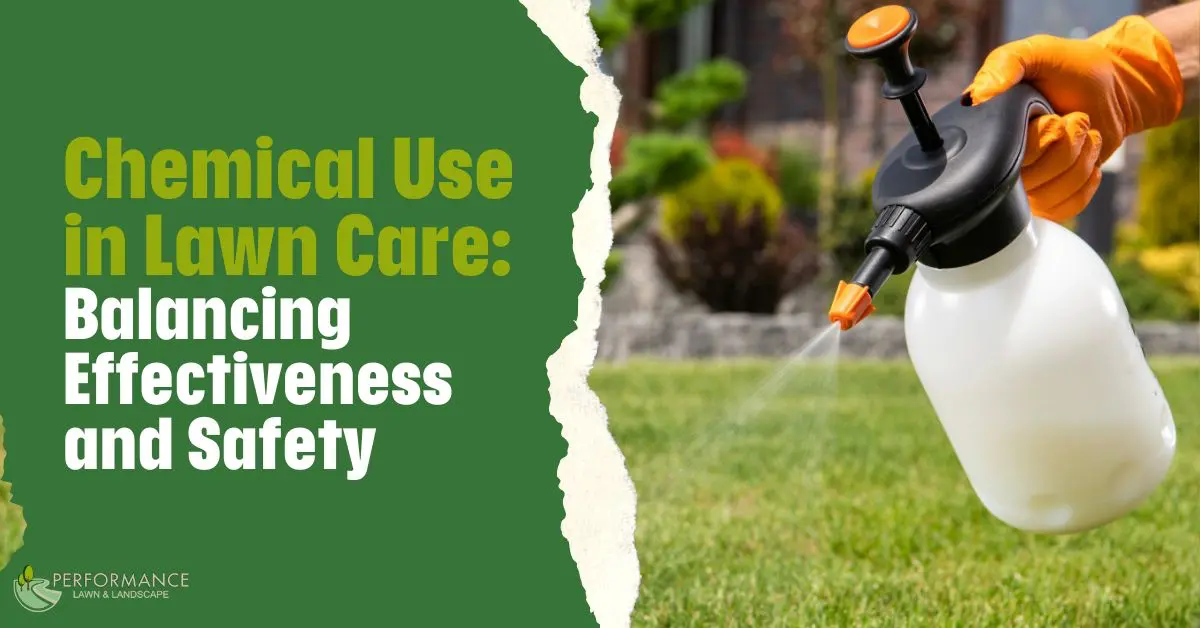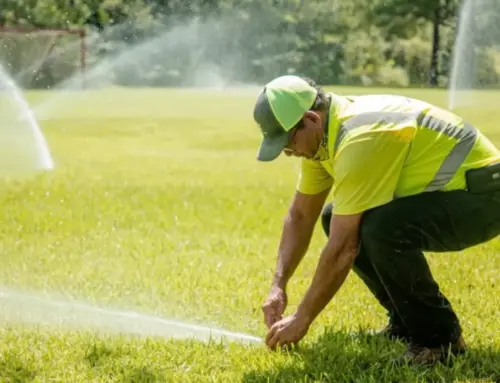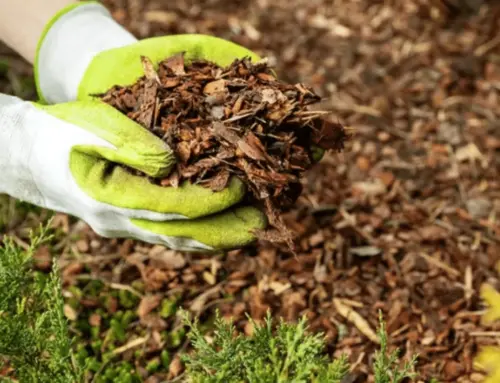At Performance Lawn and Landscapes, we know how important a green lawn is. Many homeowners are keen on having a beautiful green lawn. While chemical use in lawn care can be effective, it’s crucial to balance achieving your desired results and ensuring the safety of your family, pets, and the environment.
What chemicals are used in lawn care?
Chemicals used in lawn care encompass a range of products that address numerous aspects of lawn maintenance. These chemicals are crucial in achieving and maintaining a healthy, lush lawn. Here are some of the primary categories of chemicals used in lawn care:
 Fertilizers: Lawn fertilizers contain essential nutrients such as nitrogen, phosphorus, and potassium in varying ratios. These nutrients promote healthy grass growth, enhance color, and strengthen the lawn’s resilience.
Fertilizers: Lawn fertilizers contain essential nutrients such as nitrogen, phosphorus, and potassium in varying ratios. These nutrients promote healthy grass growth, enhance color, and strengthen the lawn’s resilience.- Herbicides: Herbicides are formulated to control and eradicate weeds that can compete with grass for nutrients, water, and space. Selective herbicides kill specific weeds without hurting others.
- Insecticides: Insecticides are used to manage and prevent infestations of insects that can cause significant damage to grass, including pests like grubs, chinch bugs, and armyworms.
- Fungicides: Fungicides are designed to combat fungal diseases that can afflict grass, such as brown patches, dollar spots, and rust. They help prevent or treat these diseases to maintain a healthy lawn.
- Pesticides: Pesticides encompass a broader category that includes insecticides, herbicides, and fungicides, providing comprehensive protection against various lawn issues.
Understanding your lawn’s demands and using these chemicals judiciously while adhering to safety guidelines can help you achieve the desired results in lawn care without compromising the environment or the well-being of your family and pets.
How do chemicals affect the environment?
Chemicals used in lawn care can impact the environment immediately and long-term. It’s important to consider their impact to maintain a balance between a healthy lawn and environmental responsibility.
 Water Pollution: Chemicals in lawn care, such as fertilizers, herbicides, and pesticides, can be washed away by rain or irrigation and enter water bodies like streams, rivers, and lakes. This runoff can lead to water pollution, harming aquatic ecosystems and potentially affecting drinking water quality.
Water Pollution: Chemicals in lawn care, such as fertilizers, herbicides, and pesticides, can be washed away by rain or irrigation and enter water bodies like streams, rivers, and lakes. This runoff can lead to water pollution, harming aquatic ecosystems and potentially affecting drinking water quality.- Soil Health: Overuse of chemicals can disrupt the natural balance of the soil. Excessive synthetic fertilizers, for example, can deplete beneficial microorganisms, reduce soil fertility, and lead to soil compaction, making it less suitable for plant growth in the long run.
- Impact on Beneficial Insects and Pollinators: Some chemicals harm bees and ladybugs, which are crucial in pollination and natural pest control. Declines in these populations can disrupt local ecosystems.
- Residue Buildup: Chemical residues can accumulate in the soil over time, posing a risk to future plant growth and potentially leaching into groundwater.
- Air Quality: Chemicals in lawn care can release volatile organic compounds (VOCs) and other pollutants into the air, contributing to air pollution and affecting human health.
To mitigate these environmental effects, using lawn care chemicals responsibly and following recommended application rates and timing is essential. Additionally, adopting organic or environmentally friendly lawn care practices, reducing chemical use, and promoting natural solutions can minimize the negative impact of chemicals on the environment.
Can organic lawn care replace chemicals?
Organic lawn care can be a viable and environmentally responsible alternative to chemical-based treatments but may sometimes provide different results. Organic practices emphasize using natural and sustainable methods to maintain a healthy lawn. Here’s how organic lawn care can replace or reduce the need for synthetic chemicals:
- Natural Fertilizers: Organic lawn care relies on natural fertilizers such as compost, compost tea, and organic matter to nourish the soil and promote grass growth. These materials enhance soil health and encourage a resilient lawn.
- Biological Pest Control: Beneficial insects, nematodes, and microorganisms are employed to manage pests naturally, reducing the need for chemical insecticides.
- Weed Prevention: Organic methods emphasize proper lawn maintenance, including regular mowing, aeration, and overseeding, to minimize weed growth without relying on herbicides.
- Non-Toxic Solutions: Organic lawn care avoids using synthetic herbicides, pesticides, and fungicides, reducing the risk of harm to the environment, pets, and children.
While organic lawn care may require more effort and time initially, it offers long-term benefits like increased soil health, lower environmental impact, and safer outdoor environment. However, the effectiveness of organic methods can vary depending on factors like soil condition, climate, and lawn care practices.
Are there risks to pets and children?
Yes, there are potential risks to pets and children associated with using chemicals in lawn care. These risks stem from the toxicity of certain lawn care products and the potential for exposure:
 Toxicity: Some chemicals used in lawn care, including herbicides, insecticides, and pesticides, can be toxic if ingested, inhaled, or absorbed through the skin. Pets and children, due to their smaller size and lower body weight, are more vulnerable to the harmful effects of these chemicals.
Toxicity: Some chemicals used in lawn care, including herbicides, insecticides, and pesticides, can be toxic if ingested, inhaled, or absorbed through the skin. Pets and children, due to their smaller size and lower body weight, are more vulnerable to the harmful effects of these chemicals.- Residue Exposure: Chemical residues from lawn care products can linger on grass, soil, and other surfaces, posing a risk of exposure when pets and children come into contact with treated areas. Residues can be transferred onto their skin, fur, or clothing.
- Allergies and Irritation: Chemicals in lawn care products may cause skin irritations or allergies in pets and children who come into direct contact with treated areas.
To minimize these risks, it’s important to follow safety guidelines provided on product labels and adhere to recommended waiting periods before allowing pets and children to access treated areas. Additionally, considering organic or chemical-free lawn care methods can help mitigate these risks and provide a safer environment for your loved ones.
What’s the cost of chemical-free lawn care?
The cost of chemical-free lawn care may vary depending on several factors:
- Initial Transition: Transitioning from chemical-based lawn care to organic practices may require upfront equipment and organic materials investment.
- Maintenance: Organic lawn care typically involves frequent mowing, aeration, and the use of natural fertilizers, which can affect ongoing maintenance costs.
- Health Benefits: While chemical-free lawn care may have slightly higher initial costs, the long-term benefits include improved soil health, reduced environmental impact, and a safer outdoor environment for your family and pets.
Choosing chemical and chemical-free lawn care ultimately depends on your priorities and values. At Performance Lawn and Landscapes, we balance achieving a beautiful lawn and ensuring safety for your family, pets, and the environment. If you have any questions or need guidance on the best lawn care practices for your situation, don’t hesitate to contact our team of experts. We’re here to help you create a healthy and vibrant outdoor space that you can enjoy with peace of mind. Contact us for more information!


 Fertilizers:
Fertilizers: Water Pollution:
Water Pollution:  Toxicity:
Toxicity:







